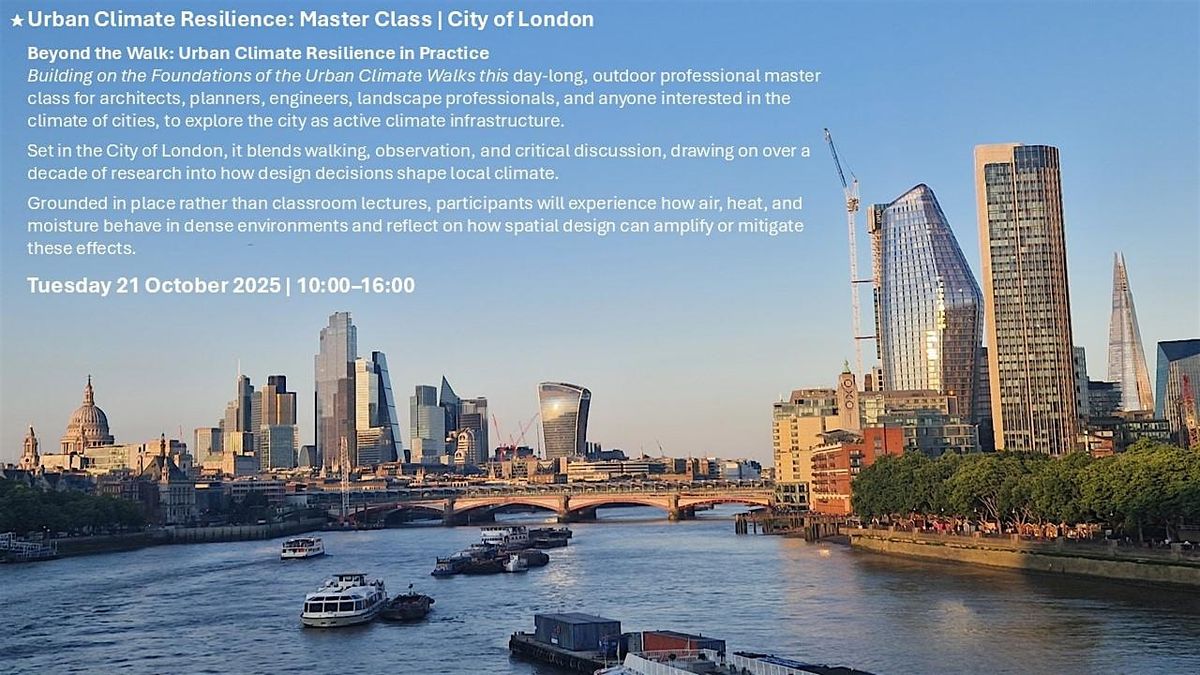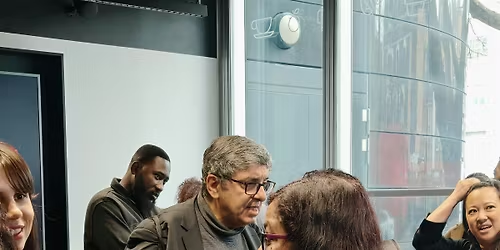
About this Event
Urban Climate Resilience: A Living Lab Day-Long Master Class in the City of London
A day-long, outdoor professional master class for architects, planners, engineers, landscape professionals, and anyone interested in the climate of cities, to explore the city as climate infrastructure.
Set in the City of London, it blends walking, observation, and critical discussion, drawing on over a decade of research into how design decisions shape local climate.
Grounded in place rather than classroom lectures, participants will experience how air, heat, and moisture behave in dense environments and reflect on how spatial design can amplify or mitigate these effects.
The format encourages interdisciplinary dialogue and shared professional learning. Suitable for both new and returning participants, it offers the chance to move beyond awareness and develop practical tools for embedding climate-responsive thinking into professional practice.
The walk is conducted under all weather conditions, in fact, harsher conditions make the outcomes more visible and the lessons more dramatic. Sensible clothing and footwear are essential: this is not a walk in the park.
Event Description
This master class positions the City of London as a living laboratory, where built form is understood not as backdrop but as active climate infrastructure. Over one day, participants will engage with abiotic (solar access, thermal exposure, ventilation and hydrology) and biotic (vegetation health and ecological resilience) dynamics as outcomes of urban morphology and surface properties across building, street, neighbourhood, and city scales. These dynamics directly affect daily experience: unshaded streets and wind exposure heighten stress, while shaded areas, green corridors, and water bodies provide relief.
Led by Dr. Julie Futcher and Will Sandy, the session builds on over a decade of internationally established Urban Climate Walks, now developed into a structured training format. Participants will explore how geometry, density, orientation, and enclosure regulate solar access, shading, ventilation, and radiative balance, the fundamental drivers of resilience, and how these processes condition the health of biotic systems such as vegetation, biodiversity, and nature-based solutions.
Why This Matters
Current urban practice exhibits systemic gaps: Despite their importance, street-level outdoor conditions remain only partially addressed in climate adaptation efforts. Approaches to tackle these issues are often fragmented, focusing on building performance or regional-scale modelling, leaving critical microclimatic factors underexplored despite their strong influence on public wellbeing and urban resilience
- Climate is treated as a background condition rather than a design parameter.
- Responsibility is fragmented between agencies and disciplines.
- Indoor and outdoor climates, energy and comfort, building and urban scales remain siloed.
- Surface treatments and greening are privileged over structural form-based drivers.
This master class exposes these gaps, repositioning the urban landscape as active climate infrastructure and showing how design decisions at the surface, building, street, and neighbourhood scale have far-reaching and long-lasting consequences.
Engaging Practitioners
Participants are not passive observers. Through guided analysis and co-production formats, professionals work directly with the Urban Climate RULES framework to:
- Analyse real sites in situ and interpret how morphology modifies climate.
- Identify dynamic seasonal “prevailing conditions.”
- Translate observations into design briefs, planning checklists, and resilience strategies.
In this way, practitioners act not only as learners but as co-authors of applied knowledge, ensuring insights are immediately transferable to planning, mobility, and design practice.
Exploring the City Through a Climate Lens
Throughout the day, participants will explore the City of London through the lens of urban climate science, analysing how buildings, surfaces, and open spaces actively regulate air, heat, and moisture.
At each site, discussion will focus not only on immediate microclimatic effects but on the far-reaching and dynamic outcomes of design decisions, how a single choice of orientation, enclosure, or surface treatment can alter:
- Thermal comfort at street level,
- Ventilation opportunities across a neighbourhood,
- The resilience of vegetation and biodiversity,
- And the long-term energy balance of the wider urban fabric.
By treating the city as a living lab, the master class reframes morphology as a primary lever of climate-responsive design, moving beyond piecemeal surface fixes to consider how the form of the urban landscape sets the abiotic conditions that underpin biotic health, resilience, and nature-based recovery.
Learning Through Experience
Participants will use simple diagnostic instruments, not for research, but as tools to make invisible processes visible: the divergence between surface and air temperature, ventilation differences across canyons, or shading contrasts that affect comfort and energy demand. These observations anchor perception in physical science, demystifying microclimate evidence and showing its practical relevance.
Structure of the Day
The entire day is conducted outdoors, with the City of London serving as a living laboratory. Participants will move through a sequence of sites, from narrow canyons to open plazas, courtyards, and riverside edges, each chosen to illustrate a different climatic effect of urban morphology.
At each stop, participants will:
- Analyse conditions in situ using simple instruments and observation.
- Interpret lessons learned about how geometry, materials, and orientation shape abiotic outcomes (solar access, shading, ventilation, thermal storage, hydrology).
- Explore biotic consequences for vegetation, biodiversity, and nature-based recovery.
- Reflect on dynamic outcomes — how design decisions at site scale, scale up into long-lasting, far-reaching impacts on urban resilience.
Lunch at Spitalfields Market (1:00 PM) provides a moment of reflection and informal discussion, continuing the emphasis on learning through place.
This progression transforms the city into an open-air classroom, where lived experience, scientific evidence, and professional dialogue expose morphology as a primary driver of climate outcomes.
Outcomes
By the end of the day, participants will:
- Diagnose how urban morphology modifies urban climate through abiotic processes.
- Understand how abiotic conditions underpin biotic health and nature-based solutions.
- Reframe climate as a design parameter, embedded into early-stage decisions.
- Apply the Urban Climate RULES framework to integrate climate evidence into professional practice.
- Translate observations into strategies for design, planning, regeneration, and policy.
Who Should Attend?
- Architects & Planners – integrate microclimate into early-stage design and regeneration strategies.
- Landscape Professionals & Urban Designers – ensure abiotic conditions support biodiversity, vegetation, and nature-based solutions.
- Engineers & Consultants – connect outdoor climate with indoor performance and assess resilience beyond the building envelope.
- Policy Makers & Developers, embed climate-responsive design into planning, procurement, and investment decisions.
- Students, build climate literacy from the outset, gain exposure to applied diagnostic methods, and connect scientific principles to lived urban experience.
Why Attend?
- This is not a generic training session. It is a field-based professional master class that delivers:
- Science in Practice, grounding urban climate science (radiation, convection, evapotranspiration) in lived urban experience.
- Diagnostic Literacy, confidence in interpreting metrics such as Height-to-Width ratio, Sky View Factor, and Wind Velocity Ratio.
- Applied Frameworks, practical use of the Urban Climate RULES to structure evidence for design briefs, planning cases, and resilience strategies.
- Competitive Edge, strengthen submissions, respond to overheating/flooding policy drivers, and demonstrate resilience credentials in practice.
Professional Learning
This format supports interdisciplinary dialogue and shared professional learning. It is designed for both first-time participants and those who have previously joined an Urban Climate Walk. For returning participants, the master class extends beyond awareness, providing the tools and frameworks to embed climate-responsive thinking into practice.
Through guided observation and structured reflection, participants gain deeper insight into how urban morphology regulates climate processes, from solar access and ventilation to thermal storage and evapotranspiration, and how these dynamics inform design, planning, policy, and investment decisions at building, street, neighbourhood, and city scales.
Event Details
Date: October 21, 2025
Time: 10:00 AM – 4:30 PM
Location: City of London (meeting point confirmed on registration)
Format: Outdoor, living lab (all weather)
Facilitators:
- Dr. Julie Futcher RIBA – Architect & Urban Climate Researcher
- Will Sandy – Landscape Architect & Ecological Design Expert
Please contact [email protected]
About the Team
Dr Julie Futcher RIBA MIntP is a chartered architect, consultant, and researcher specialising in climate-responsive urbanism. With a background in professional practice, resilience, and research-led teaching, her work investigates how emerging urban morphologies regulate energy exchanges in increasingly dense urban landscapes. Julie is developing a planning framework to help decision-makers and design teams identify and address built form–driven climate effects, supported by research strands spanning decision-making toolkits and experiential learning methodologies. She leads the internationally established Urban Climate Walking Tours, which translate urban climate science into practice and every day lived experience.
Will Sandy FLI FRSA is a landscape architect and environmentally focused designer with more than 15 years’ experience in the industry. Biophilic and ecological design is a key foundation for each project, encouraging wildlife and enhancing biodiversity, creating green connections, and linking existing green spaces as a socially responsive and resilient green/blue network. Alongside the environmental benefits, the introduction of quality green spaces has a demonstrative positive effect on the mental health and wellbeing of those who live, work and play nearby. His projects range from international collaborations such as Reframing Spaces Caracas with the British Council, to community-led retrofits in East London and new approaches to citizen led urban maintenance and management in East Sussex.
Together, Julie and Will bring an integrated perspective on the built environment as active climate infrastructure, spanning architecture, landscape, and urban design, and offer participants a unique opportunity to engage with climate science both conceptually and experientially.
Event Venue & Nearby Stays
Martha Smith Memorial Drinking Fountain, 39 Finsbury Square, London, United Kingdom
GBP 50.00 to GBP 250.00










